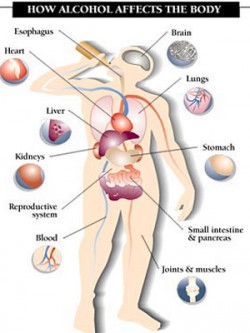Alcohol exacts damage on the body
The negative effects alcohol has on the human body are consistently predictable regardless of use pattern. There is no cell in the body that is resistant to alcohol.
The first organ is the stomach where without food, alcohol is readily absorbed into the blood stream. It requires no digestion. Alcohol irritates the stomach causing stomach acid to be increased, causing heartburn and eventually ulcers. Alcohol is also linked to cancer of the mouth, esophagus, stomach and intestines. The brain is not protected by the blood brain barrier. Alcohol is a mood altering depressant that affect neurons (nerve cells) causing misjudgment, coordination difficulties as well as effecting memory, balance and appetite. It is well known that alcohol kills brain cells. It can cause neuropathy and dementia as well as depression, anxiety and insomnia.
The liver breaks down alcohol with a dehydrogenase enzyme. The liver suffers the most damage from alcohol consumption, becoming infiltrated with fat and leading to cirrhosis — a fatal condition or alcoholic hepatitis. The liver swells and bile production is compromised leading to poor fat digestion.

Negative effects alcohol can lead to more serious problems.
The pancreas may become irritated by alcohol as well, causing swelling which blocks the flow of enzymes into the stomach resulting in digestive difficulties. The kidneys output more fluid with alcohol, because it is a diuretic, which cases dehydration later experienced as part of the “hangover” symptoms. This increased urine output also results in excess nutrient loss, and can cause kidney inflammation and infection. The heart and muscles are wasted due to poor protein intake. Many times inflammation of the muscles occurs along with increased fat deposits within muscle tissue. Blood measurements of many nutrients and indicators can be skewed by alcohol levels. Blood lipids are elevated. The intestines and rectum may be affected by poor transit time of food, or hyper-motility, interfering with nutrient absorption and causing cancers and/or hemorrhoids.
According to researchers more than one or two drinks a week promote aging. Alcohol abuse tends to make your hair dry, your lips and skin dry. It aggravates acne, makes the eyes look glassy, and the skin acquires a puffy broken vein look.
New research indicates that alcohol consumption decreases testosterone levels, and although it acts to lower sexual inhibition, it interferes with sexual performance. It is extremely toxic to unborn children causing permanent organ damage and behavioral abnormalities.
The immune system is depressed with use of alcohol. Alcohol usage is linked with breast cancer, liver cancer, pancreatic cancer, rectal cancer, mouth pharynx, larynx and esophageal cancers. It also has a correlation to high blood pressure, diabetes, kidney disease, heart disease, constipation and strokes. Alcohol usage is linked to gouty arthritis, hyperglycemia and hypoglycemia in diabetics.
Although alcohol interferes with nutrient absorption and in severe alcoholism causes lack of appetite, it can cause obesity due to the very high number of calories per gram (seven calories per gram). The more calories one consumes in alcohol, the less likely it is that they will eat enough food to obtain adequate nutrients. Alcohol impairs the absorption of calcium, phosphorus, vitamin D and zinc.
So what’s a safe level? The liver can safely metabolize no more than1/2 ounce of ethanol per hour. This reads as four ounces of wine, 10 ounces of wine cooler, 12 ounces of beer and 1-1/4 ounce of distilled 80 proof liquor. Go easy. Live long.
source: Calgary Herald
